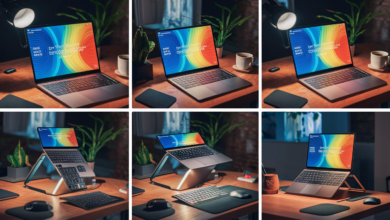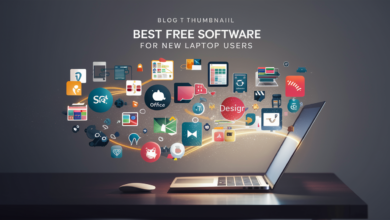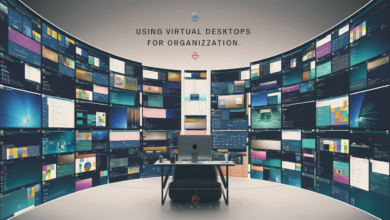Top Security Tips for Laptop Users
Introduction to laptop security
Laptops have become an integral part of our daily lives. Whether for work, study, or leisure, they hold a treasure trove of personal information and sensitive data. As convenient as they are, this portability comes with its own set of challenges—most notably the risk of security breaches. Cybercriminals are always on the lookout for vulnerable targets, and if you don’t take proactive measures to protect your laptop, you could be leaving the door wide open.
But fear not! Safeguarding your digital life doesn’t have to be daunting. With a few practical tips and tricks up your sleeve, you can significantly enhance your laptop’s security. Let’s dive into some essential strategies that every laptop user should implement to keep their data safe from prying eyes and unwanted attacks. Secure yourself against potential threats while enjoying all the benefits that technology has to offer!
Importance of protecting personal information
In today’s digital landscape, personal information is a valuable commodity. From banking details to social media profiles, our data can be exploited in myriad ways.
When this information falls into the wrong hands, the consequences can be severe—identity theft, financial loss, and emotional distress are just a few examples. Protecting your personal data isn’t just about safeguarding assets; it’s about maintaining control over your life and privacy.
Every time you log onto a device or share online, you leave behind digital footprints. Each click can potentially expose sensitive details if not managed properly.
Understanding where vulnerabilities lie enables laptop users to take proactive measures. Awareness fosters vigilance—a crucial element in ensuring that personal information remains secure from prying eyes and malicious intent. Your data deserves protection; don’t take it lightly.
Physical security measures for laptops
Physical security is a crucial aspect of protecting your laptop. Start by investing in a sturdy lock. A cable lock can deter opportunistic thieves, especially in public spaces.
Consider using a laptop backpack with anti-theft features. These bags have hidden zippers and pockets that make it difficult for anyone to access your device without you noticing.
When working in crowded areas, be aware of your surroundings. Keep your laptop close and never leave it unattended on tables or chairs.
If you’re traveling, choose secure accommodations where you can safely store your device when not in use. Always use hotel safes if available.
Remember to keep sensitive materials off the screen while working in public places. Position yourself so that prying eyes can’t easily see what you’re doing on your laptop.
Software and online security tips
Keeping your software up to date is one of the simplest yet most effective ways to enhance laptop security. Regular updates patch vulnerabilities that hackers could exploit. Make it a habit to check for updates weekly.
Utilize reputable antivirus and anti-malware programs. These tools can detect and remove threats before they cause damage. Set them to run scans automatically, ensuring you have ongoing protection without needing constant supervision.
Be cautious with email attachments and links, even if they seem legitimate. Phishing attacks are designed to trick you into revealing sensitive information or downloading malware. Always verify the source before clicking anything.
Consider using a virtual private network (VPN) when browsing online, especially on public networks. A VPN encrypts your internet connection, adding an extra layer of safety against data interception by malicious actors.
Creating strong passwords and using two-factor authentication
Creating strong passwords is the first line of defense against unauthorized access. A good password should be a mix of upper and lower case letters, numbers, and special characters. Aim for at least 12 characters; longer is always better.
Avoid easily guessable information like birthdays or names. Consider using passphrases—long strings of words that are easy to remember but hard for others to crack.
Two-factor authentication (2FA) adds an extra layer of security. Even if someone manages to steal your password, they won’t gain access without the second factor, which could be a text message code or an authenticator app.
Enable 2FA wherever possible—especially on email accounts and financial services. It’s a simple step that significantly boosts your laptop’s protection against intrusions.
Encrypting important files and backing up data
Encrypting your important files is an essential step in ensuring their privacy. By transforming data into a coded format, you protect it from unauthorized access. Even if someone manages to intercept your files, they won’t be able to decipher the information without the proper key.
Backing up your data adds another layer of security. Keeping copies stored in multiple locations—like external hard drives or cloud services—can save you from potential loss due to theft or hardware failure.
Consider using automated backup solutions that run on a schedule. This eliminates the need for manual backups and ensures that your most recent changes are saved securely.
Remember, combining encryption with regular backups creates a robust safety net for your critical documents and personal information.
Protecting against malware and viruses
Malware and viruses are persistent threats to laptop security. These malicious programs can steal your data, corrupt files, or even take control of your device.
Installing reliable antivirus software is crucial. Look for solutions that offer real-time protection and regular updates. This will help catch any new threats as they emerge.
Be cautious with email attachments and downloads. Only open files from trusted sources to minimize risk. Cybercriminals often disguise malware in seemingly harmless documents.
Regularly scanning your system also plays a vital role. Schedule automatic scans to keep your laptop clean without extra effort on your part.
Educating yourself about common scams can further protect you. Knowing the signs of phishing emails or dubious websites empowers you to navigate the online world safely.
Don’t forget about keeping everything up-to-date! Software developers frequently release patches that fix vulnerabilities, so always apply those updates promptly whenever they’re available.
Public Wi-Fi safety precautions
Public Wi-Fi is convenient, but it can also be a hotspot for cyber threats. When you connect to these networks, your data may be exposed to prying eyes.
Always avoid accessing sensitive information like banking details or personal emails on public connections. If you must use public Wi-Fi, consider using a Virtual Private Network (VPN). This encrypts your internet traffic and adds an extra layer of security.
Turning off sharing settings on your device is crucial as well. Limiting access can help safeguard your files from unauthorized users nearby.
Be cautious about the network name too. Cybercriminals often create fake Wi-Fi hotspots that mimic legitimate ones. Always double-check with staff if you’re in a café or airport before connecting.
Remember to forget the network after use so that your device doesn’t automatically reconnect later without your knowledge.
Regularly updating operating systems and software
Updating your operating system and software is crucial for maintaining laptop security. Developers constantly identify vulnerabilities that cybercriminals exploit. Regular updates patch these holes, reducing the risk of unauthorized access.
Many people delay updates due to time constraints or fear of disruptions. However, a quick update can save you from significant headaches later on. Automated settings can make this process seamless—allowing your device to update without manual intervention.
Don’t overlook third-party applications either. They can be just as susceptible to attacks if not kept current. Frequent checks help ensure all software remains fortified against emerging threats.
Remember, staying proactive with updates isn’t just about security; it also improves performance. Updated systems run smoother and offer enhanced features that may boost productivity while keeping you safe online.
Conclusion: The importance of staying vigilant in protecting your laptop and personal information
Staying vigilant in protecting your laptop and personal information is crucial. As technology evolves, so do the methods used by cybercriminals. It’s essential to adopt a proactive approach toward security.
Regularly updating software and operating systems helps close vulnerabilities that could be exploited. Strong passwords combined with two-factor authentication add an extra layer of defense against unauthorized access.
Moreover, simple physical measures like locking your laptop when not in use can prevent theft or tampering. Always remember to back up important files and encrypt sensitive data for added protection.
Being cautious on public Wi-Fi networks is just as vital since they pose significant risks to your privacy and data integrity. Using a VPN can help safeguard your online activities while connected to these networks.
By incorporating these top security tips into your daily routine, you enhance the safety of both your digital assets and personal information. The more diligent you are about cybersecurity, the less vulnerable you’ll be to potential threats lurking around every corner of the internet.




